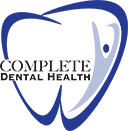The temporomandibular joint disorder, or most commonly known as TMJ, is a condition that can cause a person to suffer from pain and discomfort which affect their daily lives. It is caused by the joint that allows people to speak, eat, and use their mouths freely, but since it is frequently used, it is at risk of constant wear and tear. Unfortunately, this stress can lead to swelling, damage, and other irregularities to the joint.
Some of the things people with TMJ will feel include:
- Ringing of the ears
- Toothache
- Soreness and pain in the neck, head, shoulders, jaw, or ears
- Locked jaw
- Bite that feels misaligned
- Facial and jaw swelling
- Popping, clicking, and grinding sensations when opening or closing the jaw
Aside from the frequent use of the joint, the other causes of the disorder are stress, arthritis, trauma (jaw and mouth), misaligned bite, bruxism, and excessive gum chewing.
At Complete Dental Health, we understand how uncomfortable TMJ can be and that people who experience it are in need of relief. So to help, we have prepared some easy tips to follow at home.
Magnesium
The presence of TMJ pain may be because of spasms in the jaw and muscle tension. Eating foods that are rich in magnesium can help in relaxing the muscles and jaw. Incorporating pumpkin seeds, yogurt, black beans, almonds, figs, and dark chocolate in one’s diet could help in relieving TMJ discomfort.
Omega-3
These healthy fats are essential thanks to their anti-inflammatory properties. By helping decrease inflammation, repairing damages within the body becomes possible. Plus long-term inflammation increases a person’s risk of developing diseases, including TMJ.
Over the counter medications
People have access to various medicines that can help in reducing inflammation and easing the pain. Patients can take these medicines as long as they follow the recommended dosages.
Gentle massage
Patients are advised to gently massage and stretch their jaws since doing so can help relax and stop the jaw muscles from tensing up. Gently massage the temple and jaw muscles in a circular motion while opening and closing the jaw slowly for 30 seconds. This exercise is best done every four to six hours.
Meditate
Patients with TMJ should try relaxation techniques like exercise, yoga, and deep breathing. Observing these activities can relax the muscles of the whole body, reduce heart rate and blood pressure, as well as calm the autonomic nervous system.
Aside from these tips provided, patients should not forget to seek the assistance of a dental professional. At our practice, although it can be complicated, we see to it that proper diagnosis will be performed. Afterward, our dental professional can provide a life-changing approach to correcting TMJ.
Oral pain is something that should never be underestimated. To find relief take advantage of our TMJ: Jaw Pain Treatment in Coral Springs, FL! Call or visit us at Complete Dental Health to get started.


